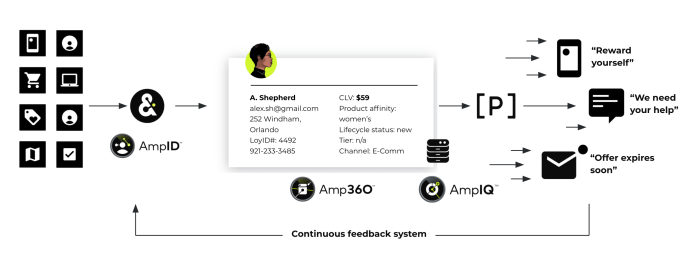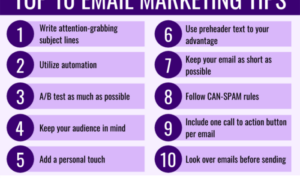Using Customer Data in Marketing sets the stage for personalized strategies that resonate with customers, driving engagement and loyalty in a digital age.
Customer data plays a key role in shaping marketing efforts, enabling businesses to tailor their messages and offerings to meet the unique needs and preferences of their target audience.
Importance of Customer Data in Marketing

Customer data is like the secret sauce that makes marketing strategies sizzle and pop! It’s the key ingredient that helps businesses understand their customers better, tailor their marketing efforts, and ultimately drive more sales. Without customer data, marketing strategies would be like shooting in the dark without a target.
Personalized Marketing Efforts
Customer data allows businesses to create personalized marketing campaigns that speak directly to the individual needs and preferences of each customer. For example, by analyzing past purchase history, businesses can send targeted promotions and recommendations that are more likely to resonate with each customer. This personal touch not only increases the chances of conversion but also enhances the overall customer experience.
Improved Customer Engagement
Using customer data to inform marketing strategies can significantly improve customer engagement. By understanding customer behavior, preferences, and pain points, businesses can create more relevant and timely marketing messages that capture the attention of their target audience. This leads to higher engagement rates, increased brand loyalty, and ultimately, more satisfied customers who keep coming back for more.
Types of Customer Data Used in Marketing
Customer data is a crucial element in modern marketing strategies, allowing businesses to tailor their campaigns to specific audiences. There are various types of customer data used in marketing, each serving a unique purpose in targeting and engaging potential customers.
Sources of Customer Data
- 1. Demographic Data: This includes information such as age, gender, income, education level, and location. Demographic data helps marketers understand the characteristics of their target audience and create campaigns that resonate with them.
- 2. Behavioral Data: This type of data tracks customers’ actions, such as website visits, clicks, purchases, and interactions with ads. Behavioral data provides insights into customers’ preferences and interests, allowing marketers to personalize their messaging and offers.
- 3. Transactional Data: Transactional data includes details of customers’ past purchases, order history, and spending patterns. This data helps marketers identify high-value customers, upsell or cross-sell products, and create loyalty programs.
- 4. Psychographic Data: Psychographic data focuses on customers’ lifestyles, values, attitudes, and interests. This type of data allows marketers to segment customers based on their personalities and motivations, enabling targeted and relevant marketing campaigns.
Utilizing Customer Data for Targeted Marketing: Using Customer Data In Marketing
Using customer data in marketing allows companies to create targeted marketing campaigns that are tailored to individual customer preferences and behaviors. By analyzing customer data, businesses can gain insights into what their customers like, how they shop, and what motivates their purchasing decisions.
Personalized Marketing Based on Customer Behavior Data
- One example of personalized marketing based on customer behavior data is sending targeted email campaigns to customers who have previously abandoned their online shopping carts. By offering them a discount or reminding them of the items they left behind, businesses can entice these customers to complete their purchase.
- Another example is using past purchase history to recommend similar products to customers. By analyzing what customers have bought in the past, businesses can suggest relevant products that match their interests and preferences.
- Utilizing customer data to create personalized product recommendations on e-commerce websites is another effective way to engage customers and increase sales. By leveraging data on browsing history and purchase behavior, businesses can display products that are more likely to appeal to individual customers.
Benefits of Targeted Marketing Using Customer Data, Using Customer Data in Marketing
- Increased Conversion Rates: Targeted marketing campaigns based on customer data are more likely to resonate with customers, leading to higher conversion rates and increased sales.
- Improved Customer Engagement: By delivering personalized messages and offers, businesses can create a more engaging experience for customers, strengthening brand loyalty and fostering long-term relationships.
- Cost-Effectiveness: Targeted marketing allows businesses to focus their resources on reaching customers who are most likely to convert, maximizing the return on investment for marketing campaigns.
- Enhanced Customer Satisfaction: By delivering relevant and timely marketing messages, businesses can enhance the overall customer experience, leading to higher satisfaction levels and repeat business.
Ethical Considerations in Using Customer Data

When it comes to using customer data in marketing, it is crucial to consider the ethical implications and respect data privacy. Customers trust businesses with their personal information, and it is important to handle this data responsibly.
Importance of Data Privacy
Maintaining data privacy is essential to building trust with customers. Businesses must ensure that customer data is protected from unauthorized access or misuse. By prioritizing data privacy, companies can show their commitment to respecting their customers’ information.
Ethical Implications of Collecting and Using Customer Data
Collecting and using customer data raises ethical concerns regarding consent, transparency, and fairness. It is important for businesses to be transparent about how they collect and use customer data, ensuring that customers are aware of how their information will be utilized. Additionally, companies must obtain explicit consent from customers before collecting and using their data for marketing purposes. Fairness in data collection and usage involves treating all customers equally and avoiding discriminatory practices based on sensitive information.
Best Practices for Ethical Use of Customer Data
Obtain explicit consent from customers before collecting and using their data.
Be transparent about data collection practices and clearly communicate how customer data will be used.
Implement robust data security measures to protect customer information from unauthorized access.
Regularly review and update privacy policies to ensure compliance with data protection regulations.












